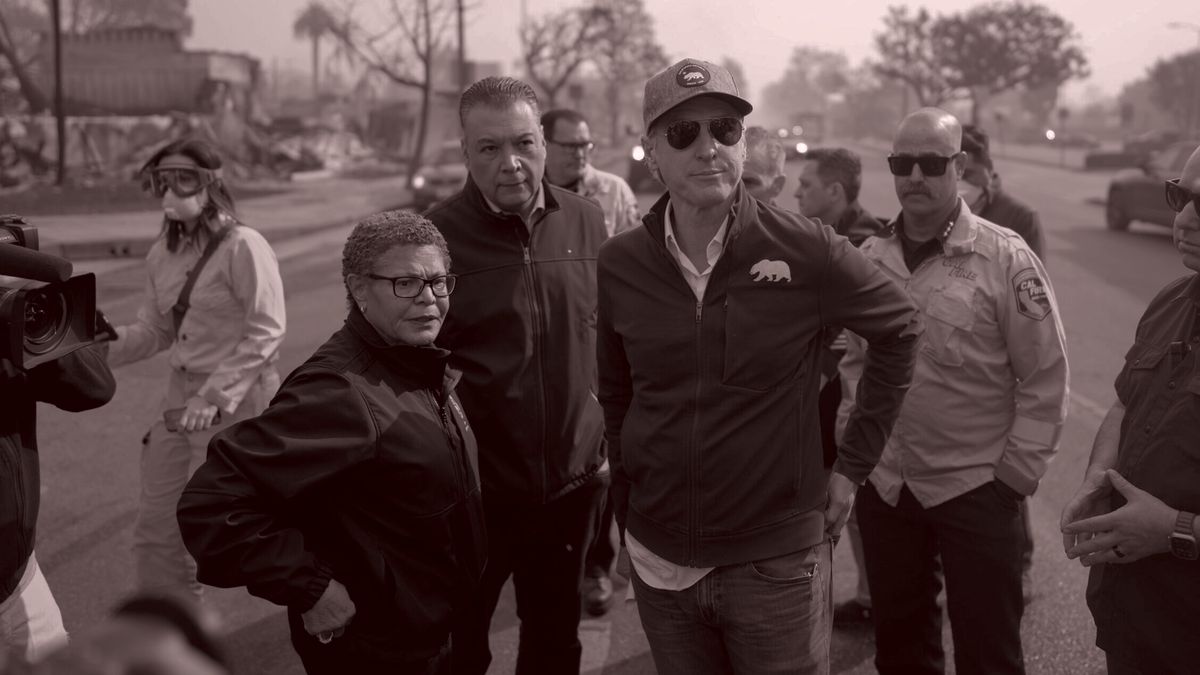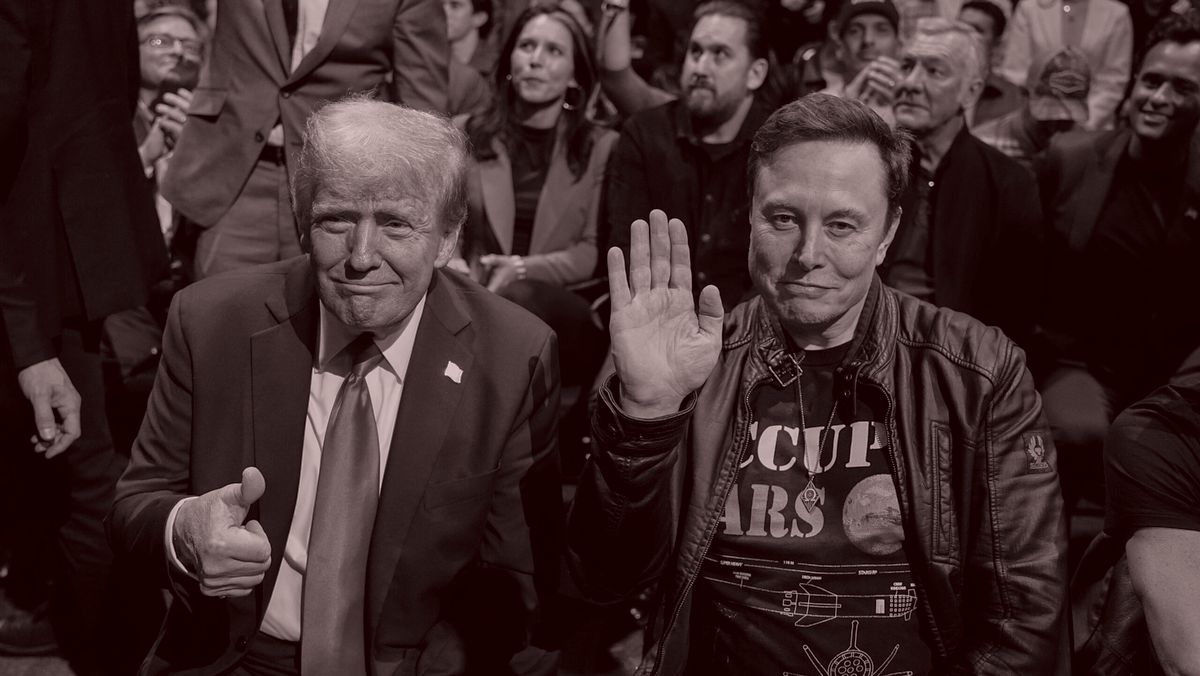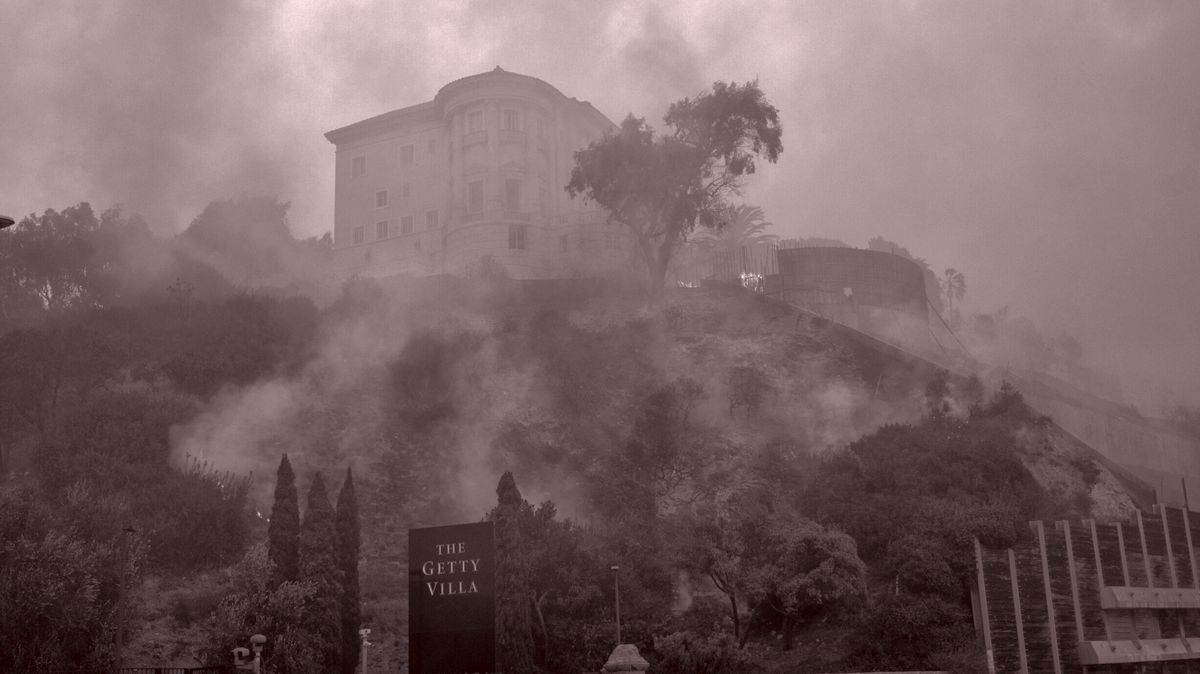Welcome back to The Best & The Brightest. I’m Peter
Hamby.
Tonight, my survey of the ashen political landscape in Los Angeles, where residents are devastated but helping each other—and absolutely fed up with out-of-staters posturing on social media as they survey the damage to their beloved homes and neighborhoods. At the same time, one politician is coming in for blame—Mayor Karen Bass—whose political future went up in
flames last week as the city burned.
But first, Abby’s inside look at tomorrow’s confirmation showdown…
|
|
|

|
Abby Livingston
|
|
The Senate Armed Services Committee will kick off the cabinet
confirmation process with a bang tomorrow when it takes up the appointment of SecDef nominee Pete Hegseth. Hegseth, who faces allegations of sexual assault and public drunkenness, will famously square off against Iowa Republican Joni Ernst—a combat veteran, sexual assault survivor, and legislative crusader against sexual assault in the military who is seen as a key swing vote with the potential to sink this nomination. Democrats, meanwhile, will look to inflict
maximum political damage via hardball questions during the televised hearing. (Hegseth denies the accusations against him.)
While Republican Armed Services chairman Roger Wicker of Mississippi will be directing the Hegseth confirmation show (along with ranking Democrat Jack Reed of Rhode Island), there are a few Armed Services Dems worth watching. The first is
Kirsten Gillibrand, who has spent time on the Armed Services committees in both the House and Senate and specialized for more than a decade in combating sexual assault in the military, often working besides Ernst. She’s also a former Boies Schiller Flexner partner who is both out of fucks to give and preparing to write a narrative for the next, post-presidential-aspiring phase of her career.
On the
junior end of the dais, Elissa Slotkin, the freshman Michigan Democrat, is as steeped in military issues as any civilian who’s served on the committee. She held a variety of national security positions spanning the George W. Bush and Obama administrations, including at the C.I.A., D.N.I., N.S.C., State Department—and the Pentagon, where she spent six years, two of them as an acting assistant secretary of defense. Notably, Slotkin’s own
anti-Trump rhetoric escalated during her Senate campaign. Last summer at the D.N.C., for instance, she unloaded on Trump Republicans: “Do not give an inch to pretenders who wrap themselves in the flag, but spit in the face of the freedoms it represents.”
|
|
|
The feckless Los Angeles mayor is certain to lose her seat, if she
isn’t recalled first. “If it is true that she left the country on a Saturday after the warning came out, that is a dereliction of duty,” Ari Emanuel, who donated to Bass’s campaign, told me.
|
|
|
Over 30 years ago, before the incineration of Altadena and the
Pacific Palisades—before Elon Musk ran wild on X, before Karen Bass and Rick Caruso were in politics, and before climate change became the left’s doomsday explanation for everything—the chaparral-flecked mountains of Southern California burned. From Malibu to Eaton Canyon, and down in Laguna Beach, the hot Santa Ana winds fueled wildfires that scorched tens of thousands of acres and razed hundreds of homes in 1993. Celebrities fled their burning
mansions down narrow canyon roads, running alongside average middle-class homeowners whose places had become a precious source of generational wealth thanks to the region’s soaring property values.
Looters prowled the abandoned neighborhoods. Republicans blamed vagrants for arson—and, indeed, arson was found to be the cause of some of the fires. City and county agencies bickered with each other in
the aftermath. In Laguna, angry victims and greedy developers presaged today’s D.E.I. finger-pointing, blaming a gay city council member for devoting “too much attention to AIDS victims and not enough on fire protection.” Eager to rebuild and reclaim their stunning hillside views of the Pacific, wealthy liberals begged Democratic leaders to neuter the California Coastal Commission and its environmental protections.
I’m cribbing these stories from Ecology of Fear, Mike Davis’s seminal book about Los Angeles and “the imagination of disaster,” which was available on Amazon last week, but has since sold out in the wake of the fires and devil winds that continue to wreak havoc on the Southland. One chapter in particular, “The Case for Letting Malibu Burn,” has been making the rounds out here, partly for its prescience about the current devastation in Los Angeles and
the human blame games that ensue. But his essay is also a reminder that the flames are not solely the result of climate change, which is what the social media manager at the D.N.C. would like you to believe. The Los Angeles Basin is its own peculiar ecosystem, veering between wet winters and dry ones, with Santa Ana winds and tinderbox scrub that have
sparked fires every few years since, well, forever.
Because of its unrivaled beauty, people in Southern California choose to live on the edge of disaster, alongside the ocean and in the mountains, building homes in places that human beings might not be meant to live. But they build anyway, collecting memories as they live and raise their families here, despite the ambient risk of flames and mudslides and
floods and quakes. Then, when disaster strikes, municipal debates that might seem tedious elsewhere—about water, insurance, zoning, brush mitigation—explode into vicious and intensely personal political battles. As Davis writes in City of Quartz, his other great history of the region, “Los Angeles homeowners … love their children, but they love their property values more.”
But another quote grabbed me over
the weekend as I thought about the current state of Los Angeles politics in the wake of the fires, and the dismal response from the city’s Democratic mayor, Karen Bass, whose political career is lying somewhere amid the tiny piles of grey ash currently accumulating on the sidewalks and rooftops across her city. Davis quotes an anonymous screenwriter who moved to the Santa Monica Mountains in the ’80s. “I was extraordinarily liberal until I came to Malibu,” the writer said. “Now I’m a fascist.”
Indeed, the absolute worst place for a politician to stand in California is between an Angeleno and their extremely valuable property.
|
People in Los Angeles are, for the most part, focused on helping
their friends and loved ones who lost everything. They are also focused on helping strangers. On Sunday night in Arcadia, at a donation center in Santa Anita Park for victims of the Eaton Fire, volunteers at one point had to stop accepting donations because there were too many people showing up to help. All over the city, Angelenos are sheltering pets. Firefighters are doing the lord’s work. A trio of my friends in Venice raised several thousand dollars over Instagram and Venmo to buy supplies
for the firefighters in our neighborhood, just one platoon in an army of heroes who have been laying hose up and down the steep, brush-choked ravines of the Palisades to fight the blaze.
My friends showed up at one Venice firehouse with pallets of water, but it turned out the firefighters wanted Zyns, Celsius, and breakfast food even more. So they went back out and bought those, too. Spreadsheets are
being organized for victims and passed around in group chats, listing all those things you need but don’t think about taking with you when a fire is racing down a hill toward your home: underwear, toys, pet food, blankets, diapers, a yoga mat, something as simple as a nail clipper.
This sort of fellowship and generosity, unusual for such a sprawling and diverse city which remains remarkably
stratified by class and race, is what most people in Los Angeles are focused on. But there is the obnoxious and inescapable background noise of social media, too, with partisans and clout-chasers rushing to X and TikTok and elsewhere to post about why the fires are the logical outcome in the failed dystopia of liberal California. Even the incoming president, himself, couldn’t resist posting about Gavin “Newscum” and California’s supposedly incompetent leadership, as the death
toll was rising in the nation’s largest state.
Musk tried to prove this out in his own icky way, meeting with local firefighters on Sunday and streaming it live on X, trying to bait the first responders into saying they didn’t have enough water to combat the Palisades fire thanks to inept Democrats. But the firefighters wouldn’t bite. They told Musk they did, in fact, have enough water. It’s just
that the blaze was so massive the water system couldn’t sustain the flow. It was an inconvenient truth for Musk, who, like other MAGA screen addicts last week, couldn’t resist posting about politics, rather than displaying a shred of humanity, even as the first plume of smoke rose up over the mountains. Babies’ cribs were incinerated, while grandparents watched a lifetime of memories turned into ash. I can report confidently, from multiple sources here on the ground, that most Angelenos would
like the social media brigade to shut the fuck up.
At the same time, Bass, elected mayor just over two years ago after years in Congress, has emerged as the singular public figure that even liberal Los Angeles is done with. It’s not because she may or may not have cut the fire department budget, or left a reservoir empty, or didn’t do enough to clean up brush and vegetation around the city, although those
questions are fair. Voters in Los Angeles, generally, understand that their mayor has relatively little power compared to executives in other cities—that the City Council has the real muscle, and that Los Angeles County has its own services and responsibilities that overlap with the city’s or operate independently from it. Local government in L.A. is as balkanized as its neighborhoods. People understand there are no easy solutions, and it will take time to learn all the facts about why the
blazes were so ruinous.
The bigger issue—the main issue—is that Bass lost the public trust in spectacular fashion. The National Weather Service warned of dangerous fire conditions on Friday, January 3. Bass knew about it, because we all did. If you live in L.A., you got the weather alert, on the news or on your phone. The mayor’s office certainly did. Despite that, Bass boarded a plane the following
day for Ghana as part of a delegation attending the inauguration of the country’s president. And as The New York Times reported over the weekend, Bass had promised during her mayoral campaign never to leave the country. It got worse on the return trip—a long way home—when a Sky News reporter happened upon Bass and an aide at the airport. The reporter asked Bass, repeatedly, to deliver a message to the city. Bass ignored him, on camera, for 90 painful seconds, in stone-faced
silence. The clip is devastating, a campaign ad ready-made, the moment for which she will always be remembered. “If it is true that she left the country on a Saturday after the warning came out, that is a dereliction of duty,” Endeavor C.E.O. Ari Emanuel, who donated to Bass’s 2022 campaign, told me.
Backers of billionaire real estate developer Rick Caruso—Bass’s once and possibly
future rival for mayor—also smell blood in water ahead of next year’s election, if a recall doesn’t come first, which is a real possibility, even though it would require a mountain of verified signatures from Los Angeles voters. But as one Democratic strategist told me, “You never know. The anger is there.”
UTA superagent Jay Sures, one of Caruso’s biggest donors and loudest
advocates in the 2022 mayor’s race, told me that Bass’s performance has been disqualifying and unforgivable. “To me, it’s utter incompetence at the highest level with the mayor’s office,” Sures told me. “The fact that she was not here on standby and ready to go? It’s unforgivable. At the end of the day, we elect leaders who are supposed to represent us and protect us and be there for us in times of need. That’s what we expect. Information should be forthright and available at a
moment’s notice. Why are we getting all of our alerts from private apps? At the end of the day, we don’t need positive words right now. We need action. We need people to get in to see their homes.”
Newsom, meanwhile, has been all over the news and more or less acting like the de facto leader of Los Angeles in the absence of clear and consistent communication from the mayor. Even if he comes
off as famously stiff, Newsom has been flooding the zone as people look for direction—meeting with victims, issuing executive orders, sending supplies, and saying yes to every interview. Bass? She’s been showing up at her news conferences, throwing to other officials, and posting every so often on social media, with banal talking points that no one wants to hear. “These fires across our region have changed lives forever,” went one X post on Saturday. “The days ahead will be challenging
but we WILL get through this crisis, together.”
How, though? Jonathan Vigliotti of CBS News asked Bass at a press conference over the weekend how the government can restore trust with locals who “are losing faith.” Somewhere in her meandering answer, Bass said that “success has been reported” and that “we are not going to let politics divide us.” Behind her, city officials shuffled around
uncomfortably.
|
“She Isn’t Built for This”
|
The job of the Los Angeles mayor is, in many ways, ceremonial. You
bring a political point of view to City Hall, and you show leadership when called upon. But it’s hard to find anyone in Los Angeles media or politics right now, including loyal Democrats, who thinks that Bass has done either of those things in the last week.
She came into office promising to be an in-the-weeds problem solver, especially on homelessness. But now, with Angelenos looking for guidance
and solutions, they’re more likely to get it from the WatchDuty app or a local news anchor or one of the many city and county officials Bass keeps deferring to during the city’s emergency briefings, televised sessions that began only after the mayor returned from abroad and the fires had already chewed through thousands of acres and hundreds of homes. “It feels like she isn’t built for this,” said one Democratic consultant working in California, pointing out that Bass has spent her entire career
in the State Assembly and in Congress. “This is wartime. This isn’t like voting no on some appropriations bill.”
I talked to another Democrat who has worked for mayors in other cities, who said that Bass “has put on a clinic on what not to do,” starting with her decision to leave the city while knowing Los Angeles was on the cusp of a tragedy. “All mayors are known for two things,” this
Democrat told me. “One of them you get to choose. And one of them is going to choose you.” Rudy Giuliani, in New York, chose to enter office as a crime fighter. But the crisis of 9/11 chose him. For Bass, the crisis not of her choosing was the fires, and she lost her credibility immediately when she refused to say something, anything, at the airport on the way back from Ghana. “That is now how everybody sees her and will always see her,” the Democrat continued. “She
obviously made the wrong choice of going in the first place, but she could have fixed all that by getting off the plane and at least saying she cared.”
No one is standing up for Bass these days. Kristin Crowley, her own fire chief, has thrown Bass under the bus in numerous media appearances, accusing her of underfunding the department. The city’s controller, a 34-year-old gadfly C.P.A.
named Kenneth Mejia, sided with Crowley, posting a lengthy social media review of Bass’s budget cuts. Meanwhile, Newsom conspicuously copied Bass on a letter announcing an investigation into the city’s water resources and fire preparation.
And Newsom, a former mayor himself, expressed a flash of angry confusion during a CNN interview with Anderson Cooper in the burning
Palisades last week, saying local officials needed to provide better answers about the response. These are all obvious signals that Bass has zero political capital left, much like Joe Biden after his disastrous debate last summer. Bass has already announced for reelection next year, a race she will almost certainly lose, possibly to Caruso, who came close to beating her last time, despite being a former Republican in a deep blue city. At the time, Bass didn’t have much of a
campaign message beyond being the next Democrat in line, but she won with the backing of an outside group organized by Hollywood mogul Jeffrey Katzenberg, which ran ads portraying Caruso as a mini-Trump. Barack Obama also gave Bass a final perfunctory lift, endorsing her late in the campaign when Bass was struggling to close the deal with L.A. voters.
Caruso, who I’m told might run for governor of California next year, has been driving the political conversation here since last Tuesday night, when the fires began ripping through his own neighborhood of the Palisades. Two years ago, Caruso portrayed Bass as a feckless career politician who lacked any sort of big vision or experience to “fix” Los Angeles. Feeling emboldened last week, Caruso called into FOX11 and lashed the mayor to host Elex Michaelson.
“We’ve got a mayor that’s out of the country, and we’ve got a city that’s burning, and there’s no resources to put out fires,” Caruso proclaimed, immediately going viral once the clip hit X. “This is absolute mismanagement by the city.”
Again: Firefighters are saying they had enough water, and Caruso himself protected his gleaming Palisades mall with the help of private firefighters. The
truth is still murky. But with Bass doing little to rally the city, frustrated Angelenos are open to whatever Caruso is saying, especially since he ran for mayor, in part, on expanding the fire department’s budget.
“We’ll never know if the outcome here would’ve been any less devastating under different leadership,” said Josh Porter, a Palisades resident who lost his home in the flames last Tuesday,
rushing out of the neighborhood with his two young children and dogs. “But we know that we elect leaders to lead, especially in times of crisis. It’s been a week since this happened and the city has heard more from the guy who lost to her than we have from her. Angelenos deserved to hear from a leader to assure them someone was driving the bus. Because it certainly didn’t feel that way.” Porter told me that his wife was in London at the time the fires exploded, but she got back to LAX from
overseas before the mayor did.
|
|
|
Join Emmy Award-winning journalist Peter Hamby, along with the team of expert journalists at Puck, as they let you
in on the conversations insiders are having across the four corners of power in America: Wall Street, Washington, Silicon Valley, and Hollywood. Presented in partnership with Audacy, new episodes publish daily, Monday through Friday.
|
|
|
Unique and privileged insight into the private conversations taking place inside boardrooms and corner offices up
and down Wall Street, relayed by best-selling author, journalist, and former M&A senior banker William D. Cohan.
|
|
|
Need help? Review our FAQ page or contact us for assistance. For brand partnerships, email ads@puck.news.
You received this email because you signed up to receive emails from Puck, or as part of your Puck account associated with . To stop receiving this newsletter and/or manage all your email preferences, click
here.
|
Puck is published by Heat Media LLC. 107 Greenwich St, New York, NY 10006
|
|
|
|


























